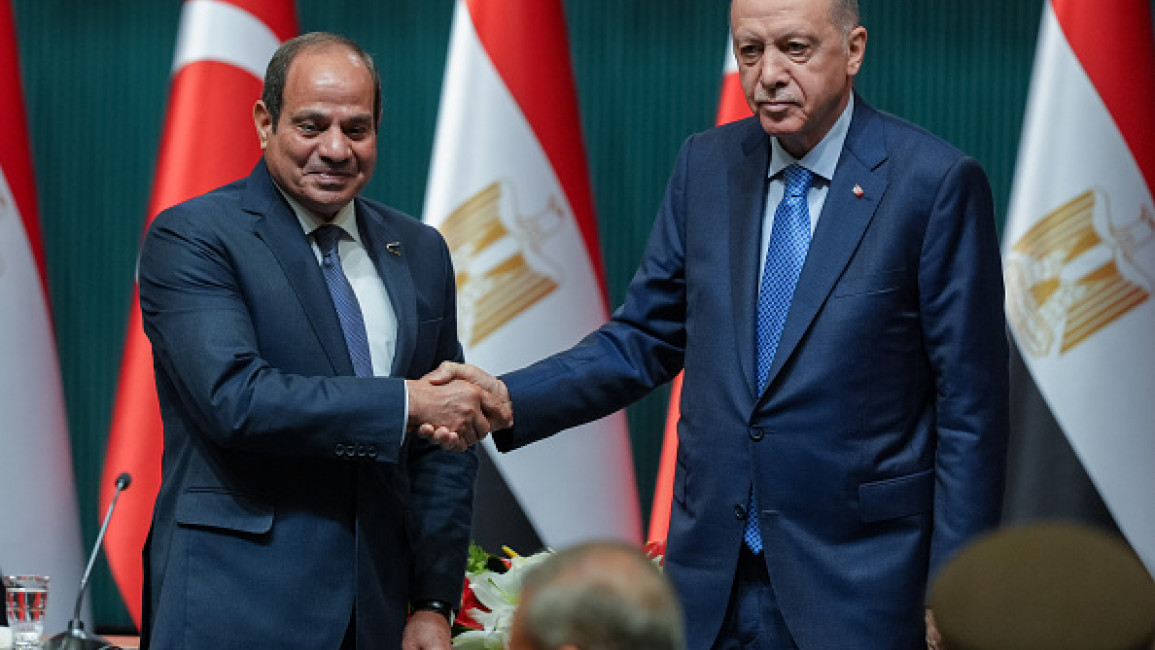Exiled Egyptian Muslim Brotherhood members 'silenced' during Sisi's visit to Turkey
Egypt's President Abdel Fattah al-Sisi's historic visit to Turkey following over a decade-long rift with Ankara has been preceded by joint security arrangements to curb potential criticism by Egyptian exiled Muslim Brotherhood group members.
"Muslim Brotherhood leaders were clearly ordered to keep silent about Sisi and the visit or else they would face grave consequences," an Egyptian security official told The New Arab on condition of anonymity for not being authorised to talk to the media.
"The Turkish authorities literally threatened that their residency would be cancelled and those with Turkish citizenship would have it revoked and be deported where no other country may accept them," the source said.
According to the source, the intelligence agencies of both countries had been coordinating the visit for weeks to ensure no interference could interrupt the process or bilateral negotiations.
The two-day visit, concluded on Thursday, was Sisi's first since he took office in 2014 following a coup that he led as Egypt's Defence Minister in 2013 against late President Mohamed Morsi, met by Turkey's condemnation.
TV channels broadcast from Turkey and run by Egyptians in self-exile had refrained from mentioning the visit, while some only referred to its significance, though they still criticised Egypt’s government policies without referring to Sisi by name.
Turkish President Recep Tayyib Erdogan had been known for having strong ties with the Muslim Brotherhood, legally designated a "terrorist group" in Egypt since December 2013, sharing their political and ideological beliefs.
Converging interests
"Until a few years ago, Erdogan never publicly recognised Sisi as the legitimate president of Egypt, frequently calling him 'a murderer,' after the execution verdict of a number of Muslim Brotherhood leaders," said a political analyst, who specialises in Islamist groups, to TNA.
"But eventually, Erdogan gave up such hostile rhetoric, referring to Sisi as 'brother,' instead, when interests prevailed and matter more for him," added the analyst who asked to remain anonymous due to the subject's political sensitivity.
During the short visit, ministers from the two countries signed 17 cooperation agreements in several domains including defence, security, culture, trade and tourism, agreeing to raise joint investments from $10 billion to $15 billion.
Following the 2013 coup, thousands of Muslim Brotherhood members and other opposition figures fled Egypt, finding refuge in Turkey as many were offered the Turkish citizenship or residency.
Many of them, whether Brotherhood members, group sympathisers or regime critics in general, operated TV channels broadcast from Turkey and used them as mouthpieces to slam Sisi and his policies.
Such attempts have been repeatedly frequently condemned by social media trolls in Egypt as well as news outlets loyal to the regime.
Over the years, the two countries have resolved their differences, both being influential regional powers.
In 2021, the Turkish government reportedly ordered Arabic-speaking TV channels broadcasting from Turkey to tone down their criticism of Sisi. Two years later, around 50 Egyptians, including opposition figures, were arrested for, reportedly, living in Turkey without visa.
Egypt and Turkey restored ties one year ago, reassigning ambassadors to Ankara and Cairo.
In 2021, the Turkish government reportedly ordered Arabic-speaking TV channels broadcasting from Turkey to tone down their criticism of Sisi.
But perhaps when the two presidents shook hands on the sidelines of the World Cup held in Doha in 2022 in a sign of rapprochement ahead.
Following Erdogan's visit to Egypt this February, also his first during Sisi's reign, Turkey revoked the citizenship of the acting head of the Muslim Brotherhood leader Mahmoud Hussein and suspended his Turkish passport. The Turkish authorities, however, denied that Erodgan's visit to Egypt had anything to do with the decision.
Observers, meanwhile, view the nearly 11-month-old Israeli onslaught on Gaza as one of the main driving forces behind the recent Cairo-Ankara rapprochement, given that both countries seek to reinforce their influence in the region.
The two countries have been seeking means to end the Israeli ongoing onslaught on Gaza that is about to enter its 12th consecutive month.




 Follow the Middle East's top stories in English at The New Arab on Google News
Follow the Middle East's top stories in English at The New Arab on Google News
![The US vetoed a UN Security Council (UNSC) resolution demanding a ceasefire in Gaza [Getty]](/sites/default/files/styles/image_330x185/public/2185152251.jpeg?h=7ef8ac04&itok=RpLSj2pu)

![An attack by paramilitary forces in Sudan has killed at least 40 people [Getty]](/sites/default/files/styles/image_330x185/public/2182364341.jpeg?h=a5f2f23a&itok=r8Fkhxdj)